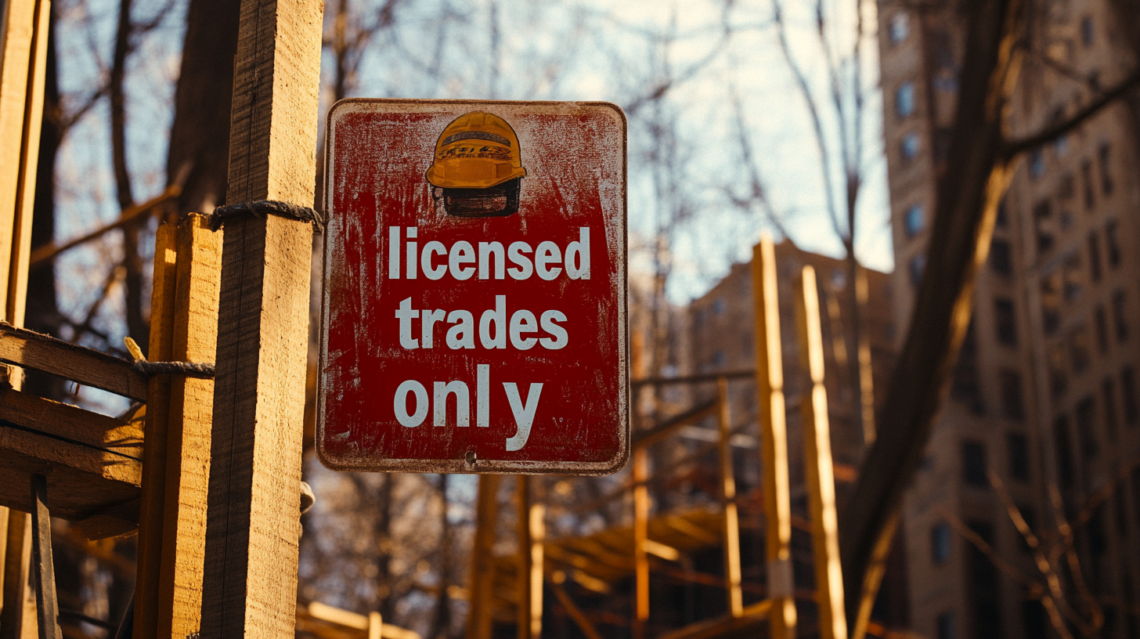
By Vatsa Modi
Picture this – you are subcontractor who has been contracted to build, weld, and otherwise complete the structural steel component of a commercial building. Your team finishes the welding – only to realize afterward that none of the workers were certified by the Canadian Welding Bureau (“CWB”), nor were they supervised by someone who was. You submit your invoice to the general contractor or the owner, but payment is refused due to “deficiencies.” Can you still enforce your right to payment?
According to the common law in Ontario, the short answer is unlikely.
In Ontario, there is a longstanding common law which echoes that a contractor may not make a claim for recovery of payment where the contractor has not complied with the licensing by-law that permits it to carry on such occupation. In the case of Calax Construction Inc. v. Lepofsky, the Court dealt with an application wherein the plaintiff renovator claimed for payment owing for work that it completed without being licensed in accordance with the applicable Toronto by-laws. The Court held that, as the plaintiff was not a licensed renovator, the subject contract was illegal and unenforceable and hereby dismissed the application.[1]
Similarly, in the case of Monticchio v. Torcema Construction Ltd., the dispute involved an unlicensed drain contractor. Reaffirming the precedent from Kocotis v. D’Angelo, the Court emphasized that the purpose of licensing by-laws is to protect the public from unqualified work, not simply to collect fees. Because the contractor lacked the necessary license, the contract here was also held to be unenforceable.[2]
In furtherance of this law, Ontario Courts have also recognized an implied condition of compliance with Ontario’s Building Code – even if it is not explicitly stated in the contract. In the case of G. Ford Homes Ltd. v. Draft Masonry (York) Co., the Courts dealt with a dispute in which the plaintiff, a fabricator and installer of residential staircases, sought payment from the defendant builder. The plaintiff was provided with the architect’s plans, but chose to ignore them, which resulted in deficiencies with the installed staircase. As a result, the Court held that as the plaintiff was the “expert”, the defendant relied upon the plaintiff’s ability to supply and install staircase in compliance with Ontario’s Building Code.[3] The Court held that this case necessitated an implied term that the staircase would be installed to comply with Ontario’s Building Code,[4] and in the alternative, a term should be implied that both the work and materials will be reasonably fit for the purpose for which they were required.[5] The Court concluded that these terms must be implied unless the circumstances of the contract are such to exclude any such obligation.[6]
Now what happens to our steel subcontractor from the beginning of this article?
In the case of Nikolic v. Kivinen – and in a recent FPC case that inspired this article – the plaintiff subcontractor performed structural steel work without valid CWB certification. In reaching its conclusion, the Courts re-iterated the various caselaw above and held that the subject contract was illegal and unenforceable by the plaintiff as the contract was performed by an uncertified welder and welding company.[7]
Furthermore, the Court maintained that the contract was not void as the innocent defendant can recover whatever damages they suffered by reason of the plaintiff’s breach of the implied term that the plaintiff was authorized by law to perform the contract, and the further implied term that the performance would be in compliance with the requirements of the Building Code. The Court affirmed that the innocent defendant could recover damages – including costs of investigation, remediation, and completion of the deficient work.[8]
The key takeaway? Even if the contract is lawful in theory, performing the work without required certification can still bar you from claiming payment.
Legal Takeaways for Contractors and Subcontractors
- Licensing and Certification Are Not Optional: You must comply with all licensing by-laws, trade regulations, and certification standards relevant to your work.
- Unlicensed Work May Result in No Payment: If your work violates a licensing or regulatory requirement, you may have no legal right to enforce the contract.
- Courts Imply Compliance Requirements: Even if not written into your contract, Courts have implied terms that the work must comply with applicable building codes.
- Innocent Defendants Can Still Enforce the Contract: If you are unlicensed or uncertified and your work is defective or non-compliant, the client may be able to recover damages from you, even if you cannot enforce against them.
Final Word
Working without the proper license or certification in Ontario is not only risky, but it may leave you unpaid and potentially liable. Whether you are a general contractor or a subcontractor, always ensure you meet all legal requirements before taking on a project.
The foregoing is for informational purposes only and should in no way be relied upon as legal advice. If you have any further questions, or would like to schedule an appointment for legal advice tailored to your circumstances and business, please contact us at dan@fridmar.com.
[1] Calax Construction Inc. v. Lepofsky, 1974 CarswellOnt 504 at para 5.
[2] Monticchio v. Torcema Construction Ltd., 1979 CarswellOnt 169 at para 7.
[3] G. Ford Homes Ltd. v. Draft Masonry (York) Co., 1983 CarswellOnt 732 at para 15 [“Ford”].
[4] Ibid at para 17.
[5] Ibid at para 18.
[6] Ibid.
[7] Nikolic v. Kivinen, 1993 CarswellOnt 3141 at para 111.
[8] Ibid.




